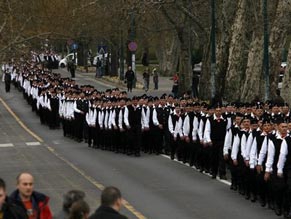|
World Jewish News

Photo by pesterlloyd.net
|
Free speech in Hungary also permits Nazi songs
21.04.2010, Anti-Semitism As Hungary approaches a second round of general election voting, campaigning has been overshadowed by barely restrained incitement against Gypsies and Jews.
The phenomenon can be glimpsed in part on the semi-legal website of a group called Division 88 (where the two eights stand for 'HH' - Heil Hitler), which features a song that jauntily combines a denial that the gas chambers existed with threats to reuse Zyklon B against the enemies of modern-day Nazis.
Freedom of speech, which Hungary's Europhile Supreme Court holds in high esteem, allows these forms of expression to flourish and take root, while both legal and bureaucratic obstacles have prevented authorities from closing down the site.
Hungarians go to the polls early next week in a second vote for the remaining seats not covered by the first round, in which the center-right Fidesz party swept the board with more than 50 per cent of the vote. Fidesz is expected to repeat its earlier success in next week's polls - but so is the extremist party Jobbik, which in the earlier vote took an unprecedented 16 per cent to become Hungary's third-strongest party.
Jobbik is anti-Gypsy, anti-Semitic and anti-capitalist; its members enjoy stoking regional tensions by calling for the restoration of "Historical Greater Hungary". And Jobbik is not alone in the region, although for historical reasons it enjoys more influence than its sister parties in neighboring states.
The problem, therefore, is not the existence of the party itself but its acceptance within the political sphere. Parties like Jobbik are normally ostracized as a result of popular revulsion. Fidesz has indeed distanced itself from Jobbik - but half-heartedly, while representatives of the two parties continue to work together at local level. Their slogans are not dissimilar and Fidesz leaders do not disguise the fact that they are targeting the same voters as the extreme right.
Partly, Fidesz is scared of alienating Jobbik supporters. And partly because they are being squeezed by their political neighbors, who basically want the same thing as they do - just a little more of it.
By Yehuda Lahav
Haaretz.com
|
|
